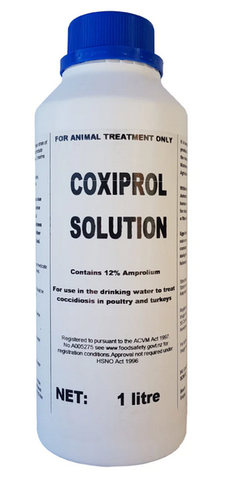Coxiprol is essential to have handy when raising young birds.
Coccidiosis is an intestinal parasite that exists just about everywhere. It can take a heavy toll on chicks, starting from about three weeks of age. The parasite multiplies greatly in the gut of the chick, and vast numbers of "oocysts" (think of them as eggs) come out in the manure. Chicks raised on litter floors scratch and peck at the litter, looking for food, and become infected. The explosive multiplication of the coccidia can lead to dead, stunted, and sick chicks. Chicks that are exposed to only low levels of coccidia become immune without becoming sick.
Control is achieved by breaking the reproductive cycle. Chicks raised on wire floors don't get coccidiosis because they don't have enough contact with the manure. Chicks raised on free-range from a very early age tend not to get it because they also don't have enough exposure. Chicks raised on old litter (used for at least six months) tend not to get it because the litter eventually harbours microscopic creatures that eat coccidia. Medicated chick starter contains drugs that suppress coccidia directly. Wet litter, crowding, intermittent feeding, and any type of stress tend to increase coccidiosis. If the feeders are empty, the chicks will spend more time nosing around in the litter. If you have an outbreak of coccidiosis, - the first signs are usually visible as ‘bloody’ poop.
A must-have if hatching and raising your own chicks!
Treating Coccidiosis
Anticoccidial drugs are very effective. The danger zone is usually around 3 to 7 weeks. Keep chicks on a crumble that contains low levels of coccidiostat. With a serious outbreak, you need to put a coccidiostat in the water, since sick chicks that will not eat will still drink. It is worth having an anticoccidial drug-like Coxiprol on hand as if caught earlier enough and treated the chicks bounce back quickly.

